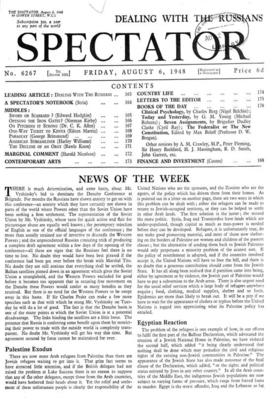NEWS OF THE WEEK
THERE is much determination, and some haste, about Mr. Vyshinsky's bid to dominate the Danube Conference at Belgrade. For months the Russians have shown anxiety to get on with this conference—an anxiety which they have certainly not shown in parts of the world where Powers other than the Soviet Union have been seeking a firm settlement. The representation of the Soviet Union by Mr. Vyshinsky, whose taste for quick action and flair for picturesque abuse are equally well known ; the peremptory rejection of English as one of the official languages of the conference ; the more than usually strained use of invective to discredit the Western Powers ; and the unprecedented Russian conjuring trick of producing a complete draft agreement within a few days of the opening of the conference—all these are signs that the Russians feel there is no time to lose. No doubt they would have been best pleased if the conference had been got over before the break with Marshal Tito. No doubt they are still anxious that everything shall be settled, the Balkan satellites pinned down in an agreement which gives the Soviet Union a stranglehold, and the Western Powers excluded for good before it becomes too apparent that in securing free movement on the Danube these Powers would confer as many benefits as they received. But there is no need for the Western Powers to be swept away in this haste. If Sir Charles Peake can make a few more speeches such as that with which he stung Mr. Vyshinsky on Tues- day he will do a lot of good. The fact is that the Danube basin is one of the many points at which the Soviet Union is at a potential disadvantage. The links binding the satellites are a little loose. The pretence that Russia is conferring some benefit upon them by restrict- ing their power to trade with the outside world is completely trans- parent. No doubt Mr. Vyshinsky will get his way this time. But agreement secured by force cannot be maintained for ever.


































